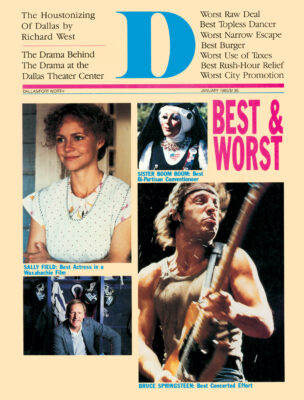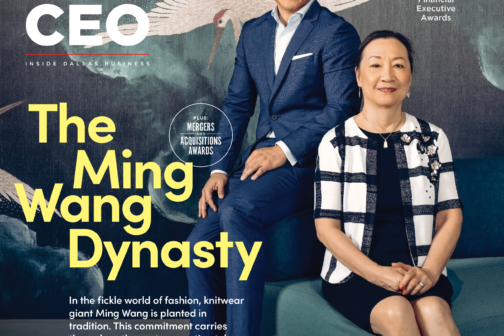This month marks the beginning of one of the most important long-term public/private endeavors that the citizens of Dallas have ever undertaken. It’s an effort to curb the flood of development in North Dallas and to divert some of that energy to the economically depressed and underdeveloped areas of southern Dallas.
As of January 1, the Housing and Economic Development Corporation of Dallas-an idea born of the February 1984 Mayor’s Task Force on Housing and Economic Development in Southern Dallas-opens for business. Its purpose is to act as a catalyst to revitalize the 200-square-mile southern Dallas area through financial and non-financial support of new residential and commercial projects that otherwise might never come to fruition.
No one understands the corporation’s potential for success or failure better than Bob Mc-Elearney, who primarily conceptualized and structured the program around the economic needs of southern Dallas for about the next 20 years.
McElearney formerly headed Dallas’ Department of Housing and Neighborhood Services, but he left his post last year to become a vice president at Sanger Harris. He says that even though the corporation needs the city’s help and money to get started, the idea is for it to eventually operate as a private, non-profit entity.
The way the corporation will initially be funded may be the pivotal issue of the entire endeavor. Currently, the city has put $1.7 million-or 10 percent of its fiscal 1984-85 Community Development Block Grant (CDBG) money-into the corporation’s coffers. McElearney says it’s likely that the corporation will rely on CDBG money for at least two more years. Then, as it begins to garner enough money from other resources, it will end its financial (and inherently political) ties with the city for good. In addition to the CDBG funds, the corporation has also received $75,000 from the Meadows Foundation, which is considering donating an additional $105,000, according to McEl-earney. He adds that the Ford Foundation might contribute money, too. The most tenuous source of money so far is the $5 million that Mayor Starke Taylor has asked former mayor Jack Evans to collect from the Dallas business community.
McElearney knows that the corporation’s greatest challenge is to establish credibility with the Dallas City Council, residents of southern Dallas and the local business community. To do that, McElearney says, the corporation’s board of directors will use the Mayor’s Task Force report to get an indication of what projects are considered important by residents of southern Dallas.
The board will then determine which projects are most feasible. “For example, one of the projects that has been recommended is the renovation of the Lancaster/Kiest Shopping Center,” McElearney says. “A ballpark figure says that it would cost $7 million. That may be too hard for us to do initially.”
He says it’s more likely that the corporation will do smaller, less risky commercial projects in order to establish a successful track record.
At the core of the corporation is a carefully selected board of directors. Its members represent minority interests as well as marketing, business and financial concerns. Taylor appointed nine of its 15 members, but in the future, the board’s membership will be self-perpetuating.
The mayor’s appointees are Viriginia Cook, president of Henry S. Miller Co.; Raul Eli-zondo, president of InterFirst Bank Oak Cliff; Ted Enloe, president of Lomas & Nettleton Financial Corp.; Sally R. Lancaster, executive vice president of the Meadows Foundation; John Stewart III, chairman of the corporation and vice chairman of RepublicBank Dallas; William Schilling, a managing partner with Peat, Marwick, Mitchell & Co.; Richard E. Tankerson, a manager at the Infomart; and Marsha Williams, an attorney with Riddle & Brown.
In addition, Virginia Belcher was elected by the Community Development Advisory Board. Architect William Collejo was elected by the Hispanic Chamber of Commerce. James Donnell, president of RepublicBank Oak Cliff, was elected by the Economic Development Advisory Board. Dr. Cleveland Gay and Thornton Vickery were elected by the Neighborhood Advisory Board, and Thomas Houston, executive director of the Black Chamber of Commerce, was elected by that chamber. The mayor, city manager and assistant city manager for planning will be permanent ex officio members of the board.
The corporation’s day-to-day operations will be run by a director who had not yet been selected at press time. McEl-earney was asked to consider the job, but he believes he can be more effective as a board member.
“The major pitfall of the thing is the expectation that this will do wonderful things tomorrow,” McElearney says. “The corporation sounds good in concept, but no one realizes that this concept is going to have to evolve over a couple of years. My real fear is that if expectations are way up here one year and we come in down here, then they will say it’s a failure. We have to be willing to give it some time.”
Related Articles

Basketball
Dallas Landing the Wings Is the Coup Eric Johnson’s Committee Needed
There was only one pro team that could realistically be lured to down. And after two years of (very) middling results, the Ad Hoc Committee on Professional Sports Recruitment and Retention delivered.

Dallas 500
Meet the Dallas 500: Mike Tomon, Co-President and COO of Legends Hospitality
The exec talks about Legends' long term partnership with Real Madrid, his leadership strategies, and the pet alligator he had in college.
By Ben Swanger



